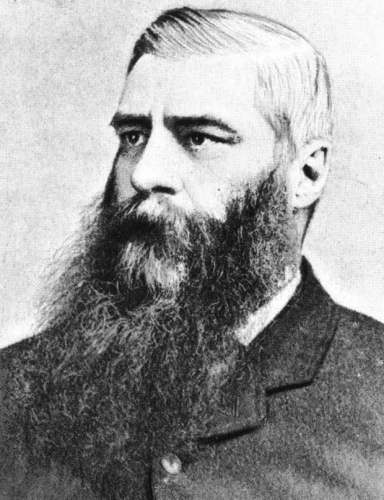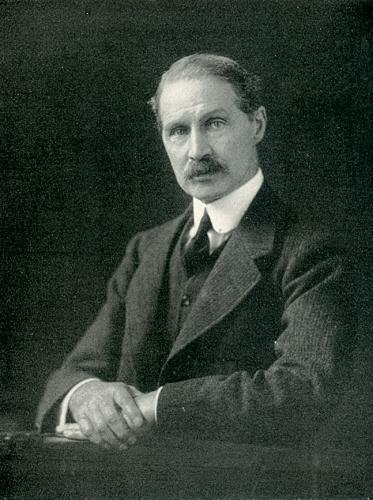
The ideas of Carl Schmitt (1888-1985), a man known as ‘the crown jurist of the Third Reich’, have enjoyed enormous currency among mainland Chinese scholars since the 2000s. The role of prominent academics such as Liu Xiaofeng 刘小枫, Gan Yang 甘阳 and Wang Shaoguang 王绍光 in promoting Schmitt’s ideas, and the fact that his theories on the state help legitimise one-party rule, have ensured that China’s ‘Schmittian’ discourse has been both fashionable and profitable (the usually heavy hand of the censors touches only ever so lightly on articles and books inspired by Schmitt).
Schmitt joined the German National Socialist, Nazi, party in 1933 when Adolf Hitler became Reichskanzler of the Third Reich and enthusiastically participated in the purge of Jews and Jewish influence from German public life. The anti-liberal and anti-Semitic Schmitt was a keen advocate of National Socialist rule and he sought to become the Third Reich’s official legal theorist. By late 1936, however, articles in the Schutzstaffel (SS) newspaper Das Schwarze Korps accused him of opportunism and Catholic recidivism. Despite the protection of Herman Göring, Schmitt’s more lofty ambitions were frustrated and thereafter he concentrated on teaching and writing.
Schmitt’s stark view of politics has attracted much criticism and debate in Euro-American scholarship. Thinkers on the left are ambivalent about his legacy, although despite the odeur of his Nazi past, he remains popular among theory-seeking academics. They see Schmitt’s ideas as deeply flawed while acknowledging his acuity and studying his writings for the insights they offer into the limitations of liberal politics, even as they impotently argue from the lofty sidelines of contemporary real-world governmentality.
In China, the reception of Schmitt’s ideas has been more straightforward; after all, even Adolf Hitler has enjoyed a measure of uncontested popularity in post-Mao China. Mainland scholars who seek to strengthen the one-party system have found in Schmitt’s writings useful arguments to bolster the role of the state, and that of the paramount leader (or Sino-demiurge), in maintaining national unity and order.
To date, Schmitt’s Chinese intellectual avatars have neglected a few key concepts in the meister’s oeuvre that could serve well the party-state’s ambitions under Big Daddy Xi Jinping. We think in particular of Schmitt’s views of Grossraum (‘Big Area’), or spheres of influence. Inspired by his understanding of the Monroe Doctrine propounded by the US in support of its uncontested hegemony in the ‘New World’, Schmitt’s Grossraum was to justify the German Reich’s European footprint and legalise its dominion. As China promotes its Community of Shared Destiny 命运共同体 in Asia and the Pacific (see our 2014 Yearbook on this theme), the concept of spheres of influence is enjoying a renewed purchase on the thinking of some international relations thinkers. See, for instance, the Australian scholar Michael Wesley’s unsettling analysis in Restless Continent: Wealth, Rivalry and Asia’s New Geopolitics (Black Ink, 2015).
During her time at the Australian Centre on China in the World in late 2013, the legal specialist Flora Sapio presented a seminar on the subject of Schmitt in China, and she kindly responded to our request to write a substantial essay on this important ‘statist’ trend in mainland intellectual culture for The China Story.
Flora Sapio is a visiting fellow at the Australian Centre on China in the World. Her research is focused on criminal justice and legal philosophy. She is the author of Sovereign Power and the Law in China (Brill, 2010); co-editor of The Politics of Law and Stability in China (Edward Elgar, 2014); and, Detention and its Reforms in China (forthcoming, Ashgate, 2016). — The Editors
___________________
We set up an ideal form [eidos],
which we take to be a goal [telos],
and we then act in such a way
as to make it become fact. [1]
The Schmittian intellectual likes to play Russian roulette but with an intriguing new twist: she believes that a single round has been placed in the revolver but she also knows this may not be the case. In fact, the only one who knows the truth is the Sovereign, a figure whose will the Schmittian cannot fathom. The Sovereign decides who plays the game and how many times. If the Schmittian turns downs this offer that can’t be refused, she would be declared an enemy and shot. Given how this intellectual predicament, masquerading as a position, commits one to always comply with the Diktat of the Sovereign, we must ask ourselves: why have several prominent Chinese intellectuals elected Herr Professor Carl Schmitt, Crown Jurist of the Third Reich, to be their intellectual patron saint?
Fulfilling a dream of wealth and power has been a feature of Chinese history and intellectual life since the late-nineteenth century. Chinese dreams, whether they be those dreamt up around the time of the 1919 May Fourth Movement, or the visions conjured up almost a century later by party-state-army leader Xi Jinping, involve a conviction that China is endowed with a distinctive national essence 国粹. The national essence is to China what the soul is to man. Just as (religious) man seeks to ascend to heaven by cultivating and purifying his soul, China can become wealthy and powerful if its national essence is enhanced and cleansed of polluting influences. The New Enlightenment Movement which emerged following the ideological thaw of the late 1970s saw traditionalism and feudalism being accused of holding China back. In the 1980s, Chinese intellectuals argued over how to revive the nation’s true nature, with many recommending an eclectic combination of Western values, theories and models in the process.[2] The Movement would witness a reversal of fortunes after the 1989 Beijing Massacre. Powerful nationalist sentiments followed in the 1990s, fuelled in part by the state and in part by a reaction to the inequalities of market reform, coupled with the public’s response to external events.
Telling Friend from Enemy

Liu Xiaofeng
It is against this fast-changing backdrop that China’s Carl Schmitt fever must be situated. It would be wrong to see the ‘invisible hand’ of the State at work behind the fad.[3] The reception of Carl Schmitt by Chinese intellectuals, some of whom are key members of the New Left, was possible only because of the work undertaken by the influential scholar Liu Xiaofeng 刘小枫 (currently a professor at Renmin University in Beijing) to translate, comment on and promote Schmitt’s opera omnia. The holder of a theology doctorate from the University of Basel, Liu argued in his PhD thesis for Christianity to be separated from both its ‘Western’ and ecclesiastical dimensions, thereby allowing Christian thought to be treated purely as an object of academic research. Christian thought, so conceived, could thus be put in dialogue with other disciplines and contribute, among other things, to the modernisation of Chinese society. Liu related the development of Christianity to the development of nations and their identities, reflecting Max Weber’s argument in The Protestant Ethic and the Spirit of Capitalism, a book that was widely read in Chinese translation and highly influential in 1980s’ mainland intellectual circles.
Liu argued that in China Christianity took root in a unique way and was independent of missionary evangelisation. Liu’s sinicisation of Christian theology enabled the development of a Sino-Christian discourse in mainland intellectual circles focused on solving ‘Chinese problems’.[4] This was, and remains, a discourse that engages with such issues as economic development, social justice, social stability and most important of all, the political legitimacy of Communist Party rule.
Liu calls himself a ‘cultural Christian’, meaning a Christian without church affiliation: one who conducts research on theological arguments and concepts for the benefit of his nation. It is no surprise then that by understanding research in these terms, Liu soon developed a fervid interest in Carl Schmitt. To Carl Schmitt, the state has a theological origin — it must be conceived of as a divine-like entity if it is to hold back chaos and disorder so as to secure peace and prosperity. Schmitt’s thesis also implies that all modern political concepts originate in theology, which in turn makes theology amenable to being treated as a form of statecraft.[5] From the outset, Liu showed himself highly receptive to these Schmittian ideas. We must also note the ease with which the writings of Carl Schmitt succeeded in China. Unlike Chinese scholarship based on Western liberal-democratic models, which was and remains prone to censorship, Chinese aficionados of Schmitt’s ‘friend-enemy’ distinction and his critique of parliamentary democracy were unimpeded in their pursuits.
As a conservative Catholic, Schmitt understood politics (which he termed ‘the Political’, in an attempt to capture its essence) as based ultimately in the friend-enemy distinction. For Chinese intellectuals who had been brought up on Maoist rhetoric,[6] and were familiar with the adaptation of this dyad of friend-enemy 敌我 for post-Maoist political use,[7] Schmitt’s friend-enemy distinction had a powerful resonance. This was a distinction that could be used to name any pair of antagonists, as long as the attributes of the named antagonists could be demonstrated to be so thoroughly incommensurable as to make them want to destroy each other, in order for each to preserve its own identity.
The friend-enemy distinction was a central feature of Schmitt’s political and constitutional theory: it grounded his critique of parliamentary democracy as well as his ideas about ‘the state of exception’ and sovereignty. Liberal democracies, Schmitt held, were trapped in false political categories: they ignored the crucial distinction between friend and enemy and therefore exposed themselves to the risk of capture by the interests of wealthy individuals and factions, who would use the state for their own goals rather than for the greater good of the people. According to Schmitt, liberal polities pretended that the government and the people were subject to the demands of reliable legal norms but the pretence was shattered whenever an internal or external enemy threatened the nation and national security. Reliance on parliamentary debates and legal procedures, he argued, posed the risk of throwing a country into chaos because they hampered the adoption of an effective and immediate response.
Schmitt held that sovereignty resides not in the rule of law but in the person or the institution who, in a time of extreme crisis, has the authority to suspend the law in order to restore normality. The authority to declare a state of emergency or Ausnahmezustand thus has unquestioned legitimacy, regardless of whether it takes the form of an actual (written) constitution or an implicit (unwritten) one. Yet how can a sovereign power that exists above and outside the law enjoy any legitimacy? Wouldn’t such a power be self-referential and premised on sheer violence? According to Schmitt, the legitimacy of such a power can be defended if one delinks the concepts of liberalism and democracy. He held that the two were substantially distinct and set about redefining the latter.
Schmitt argued that a polity founded on the sways of popular opinion could hardly be legitimate. He appealed instead to ideas about equality and the will of the people.[8] For Schmitt, political equality meant a relationship of co-belonging between the ruler and the ruled. As long as both ruler and ruled were members of the same group, or ‘friends’ holding identical views about who the enemy was, a polity was democratic. Schmitt held that where the will of the people mirrored the sovereign’s decision, rule was, indeed, by the people. Such a popular will need not be formed or expressed in terms of universal suffrage: the demands made at a public rally were sufficient to convey a popular will at work.[9]
Schmitt’s eclectic definition of the popular will led him to conceive of democracy as a democratic dictatorship. This way of thinking was very attractive to intellectuals who favoured statist and nationalist solutions to political problems and issues of international relations.[10]

Why Schmitt?
The reasons for Chinese intellectuals’ fascination with Carl Schmitt are straightforward. The related concepts of ‘friend and enemy’, ‘state of exception’ and ‘decisionism’ are simple and usable. Policy advisors and policy-makers can easily apply these concepts in their analysis of situations. Schmitt’s vocabulary can also lend theoretical weight to the articulation of reform proposals, to serve as a source of inspiration or to furnish building blocks in the construction of pro-state arguments in political science and constitutionalism. Moreover, Schmitt’s friend-enemy distinction complements and provides justification for the many narratives of nationalism and cultural exceptionalism that have become influential in Chinese scholarship in recent years. These narratives are by no means unique to China but we must note that they are at odds with the universalist and internationalist aspects of Chinese Communism as state doctrine. The gist of the Chinese Schmittian argument is that the world is not politically homogeneous but a pluriverse where radically different political systems exist in mutual antagonism. China, accordingly, is not only entitled to but must find and defend its own path to power and prosperity.
The Chinese Schmittian argument justifies the party-state’s view that Western parliamentary democracy, thick versions of the rule of law, civil society, and the values and institutions of Western constitutionalism are all unsuitable for China. Schmitt’s argument allows those who hold this view to say that such ideas belong to an ‘alien’ liberal cosmopolitanism that is ultimately damaging for the Chinese way of life. In 2013, a state directive dubbed ‘Document 9’, outlined these ideas as posing a serious threat to China’s ‘ideological sphere.’[11]
Carl Schmitt’s views have now become influential in mainland Chinese scholarship and he is frequently quoted as a foreign authority in arguments mounted against ‘liberalism’ and Western or US-inspired models of economic and political development. But the fact that Schmitt’s philosophy premises politics on exclusion and even the physical elimination of the enemy (should such an elimination be deemed necessary to the achievement of an ideological goal), is something never raised in Chinese intellectual discourse. The friend-enemy distinction encourages a stark form of binary thinking. The category of friend, however substantively defined, can be conceived only by projecting its opposite. ‘Friend’ acquires meaning through knowing what ‘enemy’ means. The attributes used to define a ‘friend’ can, as Schmitt pointed out, be drawn from diverse sources. Religion, language, ethnicity, culture, social status, ideology, gender or indeed anything else can serve as the defining element of a given friend-enemy distinction.
The friend-enemy distinction is a public distinction: it refers to friendship and enmity between groups rather than between individuals. (Private admiration for a member of a hostile group is always possible). The markers of identity, however, are relatively fluid because a political community is formed via the common identification of a perceived threat.[13] In other words, it is through singling out ‘outsiders’ that the community becomes meaningful as an ‘in-group’. This Schmittian way of defining a ‘people’ elides the necessity of a legal framework. A ‘people’, as a political community in the Schmittian sense, is primarily concerned about whether a different political community (or individuals capable of being formed into a community) poses a threat to their way of life. For Schmitt, the friend-enemy distinction is a purely political distinction and to be treated as entirely separate from ethics.[14] Since the key concern is the survival of the ‘in-group’ as a ‘people’ and a political community, Schmitt’s argument implies that the elimination of a perceived enemy can be justified as a practical necessity.[15] Hence, those who call themselves Schmittian intellectuals should be aware that Schmitt’s argument is framed around necessity. So long as a there is a necessary cause to defend, any number of deaths can be justified.
Moreover, necessity is premised on antagonism. The friend-enemy distinction grounds every aspect of Schmitt’s thinking about politics and constitutionalism. But this is precisely why Schmittian concepts have inspired some of the most effective analyses of Chinese politics and constitutionalism. Schmitt’s view of sovereignty as requiring the ruler to have the freedom to intervene as necessary for the good of the whole country is of a piece with the ‘statist intellectual trend’ 国家主义思潮 in Chinese scholarship of which Wang Shan 王山 and Wang Xiaodong 王小东 were and remain key proponents.
This movement led to the development of an argument around the importance of ‘state capacity’. In an influential 2001 work, the political scientists Wang Shaoguang 王绍光 and Hu Angang 胡鞍钢 presented ‘state capacity’ as the key to good governance and policy. They argued against democratic decision-making processes by outlining their adverse consequences. According to them, such processes can involve lengthy discussions, leading to delays in policy implementation or even to political and institutional paralysis. They saw ‘the capacity on the part of the state to transform its preference into reality’ as crucial for protecting the nation’s well-being.[16] Since then, there have been many academic publications in mainland China that present ‘state capacity’ with its corollaries of social control and performance-based legitimacy as a viable alternative to parliamentary democracy.
Quotable and Useful Ideas

Wang Shaoguang
In a subsequent work provocatively titled Four Chapters on Democracy,[17] Wang Shaoguang pays implicit tribute to Carl Schmitt’s Four Chapters on the Concept Sovereignty. Like Schmitt, Wang rejects representative democracy on the pragmatic and utilitarian grounds that such a system is ultimately incapable of improving the welfare of the entire population. Echoing the Schmittian argument of parliamentarianism’s capture by interest groups, Wang argues that universal suffrage plays into the hands of those endowed with financial means, while reducing the have-nots to the role of passive spectators.
Wang also presents a Schmittian-inspired notion of ‘the people’ as the basis of a responsive democracy, arguing that countries with a strong assimilative capacity and steering capacity (that is, the people united under a strong leader) have a higher quality of democracy. Some of Wang’s vocabulary has come from democratic political theorist Robert Dahl, but it is Schmitt’s argument that underlies Wang’s explanations of responsive democracy and state effectiveness.[18]
The ‘state capacity’ argument advanced by Wang, Hu and others has enjoyed the attention of Western scholarship on contemporary China for a decade or more. It is frequently cited in academic publications about China’s economy, political economy and public administration.
In many of these published studies (in English and other European languages), ‘state capacity’ is treated as having afforded the Chinese government an effective means for accelerating China’s economic development. The evidence of China’s economic success, in turn, has also encouraged some academics to propose that an authoritarian government may be more efficient in delivering economic growth than a liberal-democratic one. It is baffling that among those who hold this view, some have also claimed to ‘support China’s transition to a more open society based on the rule of law and human rights’.[19] If by ‘more open’ they mean greater freedom of the liberal-democratic variety, then this goal is at odds with their argument that the Chinese Communist Party’s one-party system must be strengthened through a range of capacity-building initiatives.
Schmitt’s argument has also been very influential in mainland scholarship on constitutional theory. After Mao, the party-state needed — and to an extent still needs — a distinctively Chinese political ontology. This ontology — or way of conceptualizing and understanding the world — has to include a bipartite political system, in which an extensive party apparatus exists both inside and outside the law, wielding supreme power over the state. Furthermore, this party-state system has to be internally coherent: capable of self-perpetuation to enjoy legitimacy in the eyes of both the Chinese people and foreigners. Chinese legal academics such as Qiang Shigong 強世功, who view constitutionalism in these terms, began in the 2000s to defend their position by deploying the whole arsenal of Schmittian philosophy. The result was a trinity of concepts: ‘the state of exception’, ‘constituting and constituted power’ and ‘political representation by consensus’ (representing respectively the terms State, Movement and People as used by Schmitt in his 1933 work, Staat, Bewegung, Volk), which these academics hailed as the true essence of Chinese law.
When Schmitt is directly quoted, his influence is obvious. But there are scholars such as Cui Zhiyuan 崔之元 who have made tacit use of Schmitt in their theorising about governance and politics in China. Schmitt’s influence is evident in Cui’s understanding of China as a ‘mixed constitution’ involving ‘three political levels’.[20] Similarly, Chen Ruihong’s 陈瑞洪 notion of ‘virtuous unconstitutionality’;[21] Han Yuhai’s 韩毓海 doctrine of ‘constitutionalism in a proletarian state’;[22] Hu Angang’s 胡鞍钢 rebranding of the Politburo as a ‘collective presidency’;[23] Qiang Shigong’s 强世功 model of ‘shared sovereignty under a party-state leader’,[24] are other prominent Schmittian-inspired arguments to have emerged in the last two decades. These theories belong to different areas of Chinese constitutional scholarship,[25] but they all recast the Schmittian sovereign in Chinese party-state garb. Specifically, each of these theories defends political representation by consensus, linking consensus to broad acceptance of the Diktat of the party-state. In one way or another, they also all present the ‘West’ and its political and legal institutions as unsuited for China.
To date, Western legal scholarship has properly examined neither these influential arguments nor their legal and political ramifications. But there are several scholars who have indicated the relevance of these arguments for China. For instance, Randall Pereenboom presents a useful account of the Chinese legal system as a pluriverse populated by different conceptions of the rule of law.[26] Michael Dowdle has argued, in sympathy with the New Left position, that liberal conceptions of constitutionalism are limited and that there is room for state power to be legitimated in other ways.[27] Larry Catà Backer has conceived the Party and the State as a unitary whole, a theoretical construct inspired by the reality of Chinese institutions, which allows for shuanggui 双规 detention on legal grounds.[28] These works can be read as putting the finger in the wound of some of our own contradictions. We may criticise the Chinese legal system from the purview of an idealised model of the Western legal system but at the same time we cannot avoid dealing with Chinese law as it is discussed and presented, and as it exists within the People’s Republic of China.
Several mainland intellectuals have pointed out that although Chinese Schmittians are fond of attacking the West, they don’t explain why they rely on a German political thinker to do so.[29] This criticism is useful, but it ignores how advocates of indigenous concepts and models, ‘Third Way’ proponents and Western-style liberals alike have yet to examine their uses of a logic that belongs more to Western metaphysics than to indigenous Chinese thought (Confucian or other forms of thinking derived from pre-Qin sources). This Western logic requires one to construct an ideal model of how a political system, a legal system, a society or truly any other entity should be, into which we then attempt to ‘fit’ reality, often without heeding the consequences of doing so.
At any rate, we can see that Schmittian concepts have become far more dominant than liberal ones in mainland legal scholarship. Political moderates such as He Baogang 何包钢[30] have sought to accommodate the arguments of both sides by proposing, for instance, that a constitutional court should have the power to decide on what constitutes a ‘state of exception’, on which the absolute authority of a Schmittian sovereignty is predicated. But such attempts at accommodation only reveal the weakness of the liberal position by comparison with the Schmittian one. Professor He reflects the quandary of those who seek to defend elements of a liberal democratic model (such as judicial independence) within an unaccommodating Schmittian friend-enemy paradigm.
Schmitt und Xi
Since Xi Jinping became China’s top leader in November 2012, the friend-enemy distinction so crucial to Carl Schmitt’s philosophy has found even wider applications in China, in both ‘Party theory’ and academic life. The selective revival of the Maoist rhetoric of struggle to launch a new mass line education campaign on 18 June 2013 is a good example of how the friend-enemy distinction has been adapted for present-day one-party rule.
To see the consequences of Schmittian reasoning, it is important that we consider the motivations behind Carl Schmitt’s privileging of the friend-enemy distinction and absolute sovereignty. Schmitt believed that he was theorising on behalf of the greater good. His philosophy can be rightly described as a political theology because it was inspired by the Biblical concept of kathechon [from the Greek τὸ κατέχον, ‘that what withholds’, or ὁ κατέχων, ‘the one who withholds’] — the power that restrains the advent of the Anti-Christ.[31] Schmitt transposed kathechon into a political register, defining it as the power that maintains the status quo.[32] This power can be exercised by an institution (such as the nation-state) or by the sovereign (whether as dictator or defender of the constitution). A logical consequence of Schmitt’s belief in the kathecon was the conflation of religious and political imagery. Forces which were against a given sovereignty were nothing less than evil enemies sowing the seeds of chaos and disorder. Accordingly, to protect one’s nation or sovereign was a sacred duty and the path to salvation.
We may fundamentally disagree with Chinese intellectuals who have opted to promote a Schmittian worldview. But if we are to defend intellectual pluralism, we must accept that people are free to choose their own point of view. In fact, the emergence of a Chinese Schmittian discourse in academic scholarship augments the current range of Schmittian-inspired arguments produced as much by scholars on the right as on the left in European and American settings.
We must also note that in China, as everywhere else, political differences of the left and right, or between the New Left and liberals, emerge out of and remain largely trapped in a common setting: what may be called a common political-theological paradigm, to use Schmitt’s vocabulary. Political differences are made meaningful in a common setting, out of which people receive and develop their mental schemes, their political vocabularies and the entire universe of concepts for thinking politics. The political-theological paradigm of one-party rule in the People’s Republic of China has ensured that Chinese intellectuals are bound to the mental schemes, vocabularies and concepts that this paradigm has allowed to be generated. What we must bear in mind is that Western ideas must also be accommodated into the paradigm.
Living in a country that has witnessed a rapid rise to economic wealth and global power over three decades, Schmittian intellectuals in today’s China have sought to marry a philosophy that emerged and developed in Germany from the 1920s to the 1940s with ideas about statehood that first became popular in China in the 1980s. This mix of Schmittian thinking and ‘statism’ has now become very influential in Chinese academic circles. But there doesn’t seem to be much concern about the destructive potential of Carl Schmitt’s philosophy.
_____________
Notes:
* The author would like to thank the editors of The China Story, in particular Gloria Davies, for their intellectual and stylistic contributions to this study. Subheadings have been added by the editors.
[1] François Jullien, A Treatise on Efficacy: Between Western and Chinese Thinking, Honolulu: University of Hawai’i Press, 2004, p.1.
[2] On the New Enligthenment Movement, see Xu Jilin, ‘The Fate of an Enlightenment — Twenty Years in the Chinese Intellectual Sphere (1978–1998)’, Geremie R Barmé and Gloria Davies, trans, East Asian History, n.20 (2000): 169–186. More generally, and critically, see Zhang Xudong, ed., Whither China: Intellectual Politics in Contemporary China, Durham: Duke University Press, 2001, Part I.
[3] The study of European philosophy was not a priority of the Ninth Five Year Plan on Research in the Social Sciences and Philosophy 国家哲学社会科学研究九五规划重大课题, which covered the period from 1996 to 2000, and Liu Xiaofeng’s first publication on Carl Schmitt, a review of Renato Cristi’s book Carl Schmitt and Authoritarian Liberalism, dates to 1997. See Liu Xiaofeng 刘小枫, ‘Shimite gushide youpai jiangfa: quanwei ziyouzhyi?’ 施米特故事的右派讲法: 权威自由主义? , 28 September 2005, online at: http://www.aisixiang.com/data/8911.html. On the Ninth Five Year Plan, see Guojia Zhexue Shehui Kexue Yanjiu Jiuwu (1996–2000) Guihua Bangongshi 国家哲学社会科学研究九五 (1996–2000) 规划办公室, Guojia Zhexue Shehui Kexue Yanjiu Jiuwu (1996–2000) Guihua 国家哲学社会科学研究九五 (1996–2000) 规划, Beijing 北京: Xuexi chubanshe 学习出版社, 1997.
[4] Liu Xiaofeng 刘小枫, ‘Xiandai yujing zhongde hanyu jidu shenxue’ 现代语境中的汉语基督神学, 2 April 2010, online at: http://www.aisixiang.com/data/32790.html. On Sino-Christian theology, see also Yang Huiling and Daniel HN Yeung, eds, Sino-Christian Studies in China, Newcastle: Cambridge Scholars Press, 2006; Pan-chiu Lai and Jason Lam, eds, Sino-Christian Theology: A Theological Qua Cultural Movement in Contemporary China, Frankfurt am Main: Peter Lang, 2010; and, Alexander Chow, Theosis, Sino-Christian Theology and the Second Chinese Enlightenment: Heaven and Humanity in Unity, New York: Peter Lang, 2013. For a mainstream commentary on Chinese Schmittianism, see Mark Lilla, ‘Reading Strauss in Beijing’, The New Republic, 17 December 2010, online at: http://www.newrepublic.com/article/magazine/79747/reading-leo-strauss-in-beijing-china-marx
[5] Carl Schmitt, Political Theology: Four Chapters on the Concept of Sovereignty, George Schwab, trans, Chicago: University of Chicago Press, 2005 p.36.
[6] Mao Zedong, ‘On the Correct Handling of Contradictions Among the People’, Selected Works of Chairman Mao Tsetung, Volume 5, edited by the Committee for Editing and Publishing the Works of Chairman Mao Tsetung, Central Committee of the Communist Party of China, Beijing: Foreign Language Press, 1977, pp.348–421.
[7] For an exploration of its uses in the field of public security, see Michael Dutton, Policing Chinese Politics: A History, Durham: Duke University Press, 2005.
[8] Carl Schmitt, Dictatorship: From the origin of the modern concept of sovereignty to proletarian class struggle, Michael Hoelzl and Graham Ward, trans, Cambridge: Polity Press, 2014.
[9] Carl Schmitt, The Crisis of Parliamentary Democracy, Ellen Kennedy, trans, Cambridge and London: MIT Press, 2000; and, Carl Schmitt, Constitutional Theory, Jeffrey Seitzer, trans, Durham: Duke University Press, 2008.
[10] On the statist and nationalist intellectual trend, see Xu Jilin 许纪霖, ‘Jin shinianlai Zhongguo guojiazhuyi sichaozhi pipan’ 近十年来中国国家主义思潮之批判, 5 July 2011, online at: http://www.aisixiang.com/data/41945.html
[11] ‘Communiqué on the Current State of the Ideological Sphere. A Notice from the Central Committee of the Communist Party of China’s General Office’, online at: http://www.chinafile.com/document-9-chinafile-translation.
[12] As, for instance, a relationship of agonism, where the Schmittian enemy becomes an adversary. In this context, see Chantal Mouffe, On the Political. London and New York: Routledge, 2005.
[13] Carl Schmitt, The Concept of the Political, George Schwab, trans, Chicago: University of Chicago Press, 2007, p.38.
[14] Schmitt, The Concept of the Political, pp.25–27.
[15] Schmitt, The Concept of the Political, pp.46–48.
[16] By which Wang and Hu mean: ‘the ratio between the actual degree of intervention that the state is capable of realizing and the scope of intervention that the state hopes to achieve.’ See Wang Shaoguang and Hu Angang, The Chinese Economy in Crisis: State Capacity and Tax Reform, New York: ME Sharpe, 2001, p.190.
[17] Wang Shaoguang 王绍光, Minzhu sijiang 民主四讲, Beijing 北京: Sanlian shudian 三联书店, 2008.
[18] Wang Shaoguang, ‘The Problem of State Weakness’, Journal of Democracy 14.1 (2003): 36-42. By the same author, see ‘Democracy and State Effectiveness’, in Natalia Dinello and Vladimir Popov, eds, Political Institutions and Development: failed expectations and renewal hopes, London: Edward Elgar, 2007, pp.140-167.
[19] ‘EU-China Human Rights Dialogue’, online at: http://eeas.europa.eu/delegations/china/eu_china/political_relations/humain_rights_dialogue/index_en.htm
[20] Cui Zhiyuan 崔之元, ‘A Mixed Constitution and a Tri-level Analysis of Chinese Politics’ 混合宪法与对中国政治的三层分析, 25 March 2008, online at: http://www.aisixiang.com/data/18117.html
[21] Chen Ruihong 陈瑞洪, ‘A World Cup for Studies of Constitutional Law: a Dialogue between Political and Constitutional Scholars on Constitutional Power’ 宪法学的知识界碑 — 政治学者和宪法学者关于制宪权的对话, 5 October 2010, online at: http://www.aisixiang.com/data/36400.html; and, also Xianfa yu zhuquan 宪法与主权, Beijing 北京: Falü chubanshe 法律出版社, 2007.
[22] Han Yuhai 韩毓海, ‘The Constitution and the Proletarian State’ 宪政与无产阶级国家 online at: http://www.globalview.cn/ReadNews.asp?NewsID=34640.
[23] Hu Angang, China’s Collective Presidency, New York: Springer, 2014.
[24] Qiang Shigong 强世功, ‘The Unwritten Constitution in China’s Constitution’ 中国宪法中的不成文宪法, 19 June 2010, online at: http://www.aisixiang.com/data/related-34372.html.
[25] See also the special issue ‘The Basis for the Legitimacy of the Chinese Political System: Whence and Whither? Dialogues among Western and Chinese Scholars VII’, Modern China, vol.40, no.2 (March 2014).
[26] Randall Peerenboom, China’s Long March Towards the Rule of Law, Cambridge: Cambridge University Press, 2002.
[27] Michael Dowdle, ‘Constitutional Listening’, Chicago Kent Law Review, vol.88, issue 1, (2012-2013): 115–156.
[28] Larry Catá Backer and Keren Wang, ‘The Emerging Structures of Socialist Constitutionalism with Chinese Characteristics: Extra Judicial Detention (Laojiao and Shuanggui) and the Chinese Constitutional Order’, Pacific Rim Law and Policy Journal, vol.23, no.2 (2014): 251–341.
[29] Liu Yu 刘瑜, ‘Have you read your Schmitt today?’ 你今天施密特了吗?, Caijing, 30 August 2010, online at: http://blog.caijing.com.cn/expert_article-151338-10488.shtml option=com_content&view=article&id=189:2010-10-08-21-43-05&catid=29:works&Itemid=69&lang=en
[30] He Baogang 何包钢, ‘In Defence of Procedure: a liberal’s critique of Carl Schmitt’s theory of exception’ 保卫程序 一个自由主义者对卡尔施密特例外理论的批评, 26 December 2003, online at: http://www.china-review.com/sao.asp?id=2559
[31] ‘Let no man deceive you by any means: for that day shall not come, except there come a falling away first, and that man of sin be revealed, the son of perdition; Who opposeth and exalteth himself above all that is called God, or that is worshipped; so that he as God sitteth in the temple of God, shewing himself that he is God. Remember ye not, that, when I was yet with you, I told you these things? And now ye know what withholdeth that he might be revealed in this time. For the mystery of iniquity doth already work: only he who know letteth will tell, until he be taken out of the way’. See, The Bible: New Testament, 2 Thessalonians 2: 3-8.
[32] For a simple illustration, see Gopal Balakrishnan, The Enemy: An Intellectual Portrait of Carl Schmitt, London: Verso, 2002, Chapter 17. An overview of debates about the role of the katechon and a genealogy of the concept in Carl Schmitt’s political theology can be found in Julia Hell, ‘Katechon: Carl Schmitt’s Imperial Theology and the Ruins of the Future’, The Germanic Review, vol.84, issue 4, (2009): 283-325.







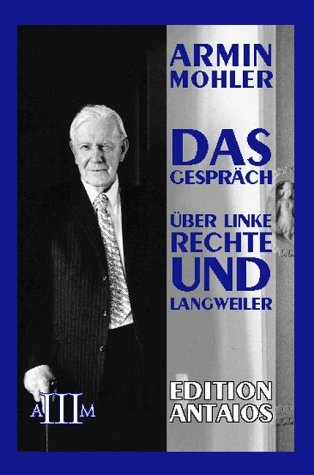


 del.icio.us
del.icio.us
 Digg
Digg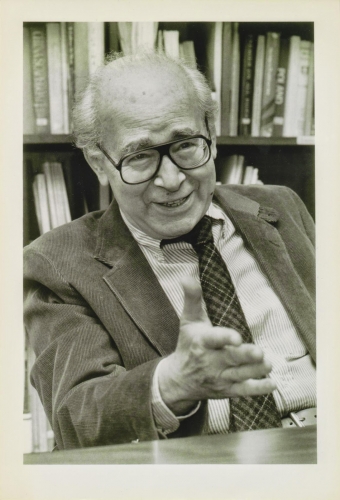

 L'auteur explique l'échec historique de la contre-révolution par plusieurs raisons, que nous pouvons toutefois regrouper dans une seule catégorie, relative aux techniques de communication modernes, bien trop délaissées par les penseurs contre-révolutionnaires, «largement incapables d'utiliser des méthodes modernes, une organisation, des slogans, des partis politiques et la presse» (p. 179). C'est d'ailleurs grâce à leurs écrits que les révolutionnaires ont imposé leurs idées, jusque y compris dans le camp adverse : «Á mesure que les années passaient, les idées proposées par le parti révolutionnaire paraissaient de plus en plus attrayantes, non pas en raison de leurs mérites intrinsèques, mais parce qu'elles imprégnaient le climat intellectuel, acquéraient un monopole, isolaient les idées contraires en arguant de leur modération pour prouver leur impotence» (p. 59). Cette idée n'est à proprement parler pas vraiment neuve, puisque Taine puis Maurras l'ont développée avec quelques nuances, le premier critiquant la décorrélation de plus en plus prononcée entre la réalité et les discours évoquant cette dernière (2), le second affirmant que la Révolution française ne s'était pas produite le 14 juillet 1789 mais, comme l'écrit Molnar, qu'«elle s'est faite bien avant au tréfond[s] de l'esprit et de la sensibilité populaires, imprégnés des écrits des philosophes» (p. 65). D'une certaine manière, cette thèse fut aussi développée par le général Giraud qui dans un article paru durant l'été 1940 attribua une partie de la défaite française à la littérature, coupable à ses yeux d'avoir sapé les bases de la nation, puis par Jean Raspail dans son (trop) fameux
L'auteur explique l'échec historique de la contre-révolution par plusieurs raisons, que nous pouvons toutefois regrouper dans une seule catégorie, relative aux techniques de communication modernes, bien trop délaissées par les penseurs contre-révolutionnaires, «largement incapables d'utiliser des méthodes modernes, une organisation, des slogans, des partis politiques et la presse» (p. 179). C'est d'ailleurs grâce à leurs écrits que les révolutionnaires ont imposé leurs idées, jusque y compris dans le camp adverse : «Á mesure que les années passaient, les idées proposées par le parti révolutionnaire paraissaient de plus en plus attrayantes, non pas en raison de leurs mérites intrinsèques, mais parce qu'elles imprégnaient le climat intellectuel, acquéraient un monopole, isolaient les idées contraires en arguant de leur modération pour prouver leur impotence» (p. 59). Cette idée n'est à proprement parler pas vraiment neuve, puisque Taine puis Maurras l'ont développée avec quelques nuances, le premier critiquant la décorrélation de plus en plus prononcée entre la réalité et les discours évoquant cette dernière (2), le second affirmant que la Révolution française ne s'était pas produite le 14 juillet 1789 mais, comme l'écrit Molnar, qu'«elle s'est faite bien avant au tréfond[s] de l'esprit et de la sensibilité populaires, imprégnés des écrits des philosophes» (p. 65). D'une certaine manière, cette thèse fut aussi développée par le général Giraud qui dans un article paru durant l'été 1940 attribua une partie de la défaite française à la littérature, coupable à ses yeux d'avoir sapé les bases de la nation, puis par Jean Raspail dans son (trop) fameux  Il serait pour le moins difficile de dénier à Thomas Molnar la justesse de tels propos, y compris si nous devions tracer quelque parallèle avec notre propre époque, où triomphent ces «intellectuels des classes moyennes» (p. 108) qui à force de cocktails et de mauvais livres cherchent à s'émanciper de leur caste, pour fréquenter les grands, ou ceux qu'ils considèrent comme des grands, tout en n'affectant qu'un souci fallacieux de ce qu'ils méprisent au fond par-dessus tout et qu'ils sont généralement vite prêts à qualifier du terme méprisant (dans leur bouche) de peuple. Ce peuple est instrumentalisé, et ce n'est que par tactique que les intellectuels révolutionnaires peuvent donner l'impression de le flatter, voire de le respecter : «Ce qui est essentiel, les révolutionnaires ont rapidement compris que bien que 1789 ait ouvert la porte du pouvoir aux masses, celles-ci ne l'utiliseront jamais pour elles-mêmes, mais permettront seulement qu'il passe entre les mains de ces nouveaux privilégiés que sont les entraîneurs de foules, les faiseurs d'opinion et les idéologues» (p. 119). Finalement, la révolution n'est pas grand-chose, si nous nous avisions de la séparer de ses béquilles, que Thomas Molnar appelle «sa méthode de propagation dans tous les coins de la société» (p. 110) et, surtout, l'élevage quasiment industriel de ces intellectuels si remarquablement définis par
Il serait pour le moins difficile de dénier à Thomas Molnar la justesse de tels propos, y compris si nous devions tracer quelque parallèle avec notre propre époque, où triomphent ces «intellectuels des classes moyennes» (p. 108) qui à force de cocktails et de mauvais livres cherchent à s'émanciper de leur caste, pour fréquenter les grands, ou ceux qu'ils considèrent comme des grands, tout en n'affectant qu'un souci fallacieux de ce qu'ils méprisent au fond par-dessus tout et qu'ils sont généralement vite prêts à qualifier du terme méprisant (dans leur bouche) de peuple. Ce peuple est instrumentalisé, et ce n'est que par tactique que les intellectuels révolutionnaires peuvent donner l'impression de le flatter, voire de le respecter : «Ce qui est essentiel, les révolutionnaires ont rapidement compris que bien que 1789 ait ouvert la porte du pouvoir aux masses, celles-ci ne l'utiliseront jamais pour elles-mêmes, mais permettront seulement qu'il passe entre les mains de ces nouveaux privilégiés que sont les entraîneurs de foules, les faiseurs d'opinion et les idéologues» (p. 119). Finalement, la révolution n'est pas grand-chose, si nous nous avisions de la séparer de ses béquilles, que Thomas Molnar appelle «sa méthode de propagation dans tous les coins de la société» (p. 110) et, surtout, l'élevage quasiment industriel de ces intellectuels si remarquablement définis par 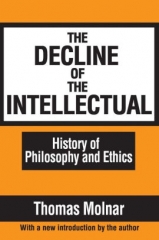 L'écrivain contre-révolutionnaire, quoi qu'il affirme, reste irrévocablement marqué au fer du provincialisme et, précise Thomas Molnar, est accablé par la mauvaise conscience de ceux «qui n'ont pratiquement jamais entendu répéter leurs paroles, vu reprendre leurs idées» (p. 174) : «il ne représente au regard de l'histoire qu'un moment peut-être brillant, mais passé, donc isolé, déposé loin du lit principal du fleuve» (p. 122), alors que, en face de lui, vainqueur qui n'a même pas eu besoin de mener un combat, se dresse l'intellectuel révolutionnaire, un de ces hommes «perpétuellement déchirés entre l'action et la réflexion, le bureau du philosophe et les barricades du révolutionnaire, la prose résignée du sceptique et l'allure de David devant Goliath, le mépris de l'esthète devant le chaos et l'enthousiasme du guerillero dans le feu de l'action» (pp. 126-7), description qui pourrait sans aucune difficulté s'appliquer à la majorité de nos propres penseurs révolutionnaires et même, sans doute, aux rares qui font profession de penseurs contre-révolutionnaires ou, disent les pions universitaires, d'
L'écrivain contre-révolutionnaire, quoi qu'il affirme, reste irrévocablement marqué au fer du provincialisme et, précise Thomas Molnar, est accablé par la mauvaise conscience de ceux «qui n'ont pratiquement jamais entendu répéter leurs paroles, vu reprendre leurs idées» (p. 174) : «il ne représente au regard de l'histoire qu'un moment peut-être brillant, mais passé, donc isolé, déposé loin du lit principal du fleuve» (p. 122), alors que, en face de lui, vainqueur qui n'a même pas eu besoin de mener un combat, se dresse l'intellectuel révolutionnaire, un de ces hommes «perpétuellement déchirés entre l'action et la réflexion, le bureau du philosophe et les barricades du révolutionnaire, la prose résignée du sceptique et l'allure de David devant Goliath, le mépris de l'esthète devant le chaos et l'enthousiasme du guerillero dans le feu de l'action» (pp. 126-7), description qui pourrait sans aucune difficulté s'appliquer à la majorité de nos propres penseurs révolutionnaires et même, sans doute, aux rares qui font profession de penseurs contre-révolutionnaires ou, disent les pions universitaires, d'

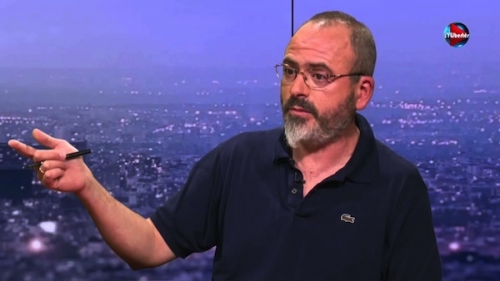
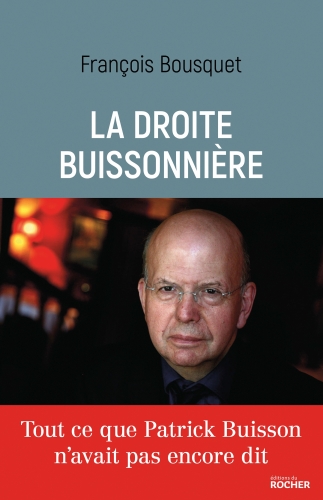 Me relisant, je me dis que j'ai finalement du mérite à m'être en fin de compte plongé dans la lecture de l'ouvrage de François Bousquet dont on ne pourra guère m'accuser, du coup, de vanter louchement les mérites qui, sans être absolument admirables ni même originaux, n'en sont pas moins bien réels : mes préventions, toujours, tombent devant ma curiosité, ma faim ogresque de lectures, et ce n'est que fort normal.
Me relisant, je me dis que j'ai finalement du mérite à m'être en fin de compte plongé dans la lecture de l'ouvrage de François Bousquet dont on ne pourra guère m'accuser, du coup, de vanter louchement les mérites qui, sans être absolument admirables ni même originaux, n'en sont pas moins bien réels : mes préventions, toujours, tombent devant ma curiosité, ma faim ogresque de lectures, et ce n'est que fort normal.
 Reste une autre solution, plus fictionnelle, donc métapolitique, que réellement, modestement politique, sur le papier en tout cas ne souffrant point l'endogamie propre à l'élite française, de droite comme de gauche, solution purement romanesque qu'explore Bruno de Cessole dans son dernier livre, L'Île du dernier homme, et que nous pourrions du reste je crois sans trop de mal rapprocher de la vision de l'Islam développée depuis quelques années par Marc-Édouard Nabe, consistant à trouver, dans la vitalité incontestable des nouveaux Barbares, le sang nécessaire pour irriguer la vieille pompe à bout de force d'un Occident en déclin, d'une France complètement vidée de sa substance, d'un arbre, si cher au
Reste une autre solution, plus fictionnelle, donc métapolitique, que réellement, modestement politique, sur le papier en tout cas ne souffrant point l'endogamie propre à l'élite française, de droite comme de gauche, solution purement romanesque qu'explore Bruno de Cessole dans son dernier livre, L'Île du dernier homme, et que nous pourrions du reste je crois sans trop de mal rapprocher de la vision de l'Islam développée depuis quelques années par Marc-Édouard Nabe, consistant à trouver, dans la vitalité incontestable des nouveaux Barbares, le sang nécessaire pour irriguer la vieille pompe à bout de force d'un Occident en déclin, d'une France complètement vidée de sa substance, d'un arbre, si cher au 
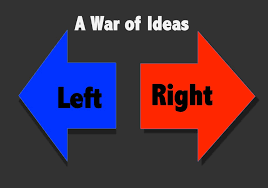
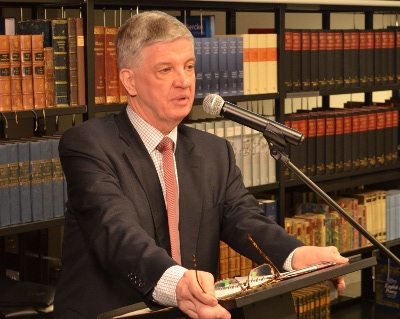
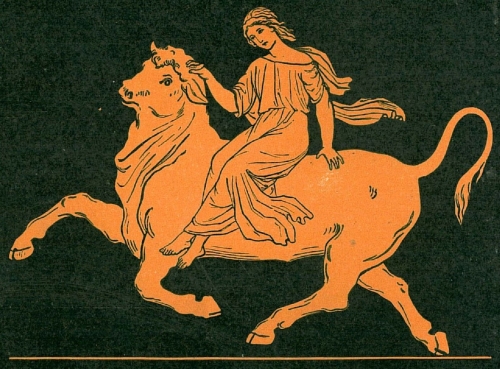
 Ensuite, Daniel Cologne tente de définir la Droite dans un deuxième chapitre. Celui-ci fait le constat qu’« une des plus belles victoires du terrorisme intellectuel de la Gauche a été d’imposer à l’opinion une fausse définition de la Droite (p. 9) ». Sa définition de la Droite est en fait synonyme de verticalité, belle référence évolienne. « Julius Evola propose d’ailleurs de redéfinir la Droite comme une tournure d’esprit traditionaliste. L’homme de droite est celui qui adhère aux valeurs dont on trouve l’empreinte dans toutes les grandes civilisations indo-européennes : prééminence du politique, de l’éthique et du culturel sur l’économique et le social, nécessité d’un État fort capable d’organiser en un tout cohérent la pluralité naturelle de la société, nécessité de l’aristocratie (au sens étymologique grec de “ gouvernement des meilleurs ”), reconnaissance des valeurs héroïques comme critères de l’élite, refus du matérialisme (p.10). »
Ensuite, Daniel Cologne tente de définir la Droite dans un deuxième chapitre. Celui-ci fait le constat qu’« une des plus belles victoires du terrorisme intellectuel de la Gauche a été d’imposer à l’opinion une fausse définition de la Droite (p. 9) ». Sa définition de la Droite est en fait synonyme de verticalité, belle référence évolienne. « Julius Evola propose d’ailleurs de redéfinir la Droite comme une tournure d’esprit traditionaliste. L’homme de droite est celui qui adhère aux valeurs dont on trouve l’empreinte dans toutes les grandes civilisations indo-européennes : prééminence du politique, de l’éthique et du culturel sur l’économique et le social, nécessité d’un État fort capable d’organiser en un tout cohérent la pluralité naturelle de la société, nécessité de l’aristocratie (au sens étymologique grec de “ gouvernement des meilleurs ”), reconnaissance des valeurs héroïques comme critères de l’élite, refus du matérialisme (p.10). »

 Dans son texte, « Le retour de la vraie Droite », l’auteur revient en premier lieu sur l’ascension culturelle de la Gauche et conqtate que « les idéaux de l’Occident ont subi une inversion totale, et des idées qui se situaient initialement à la périphérie de l’extrême gauche ont été élevées au rang de normes sociales qui prévalent aujourd’hui dans l’éducation, les médias, les institutions gouvernementales et les ONG privées (p. 2) ». Un tel résultat, nous explique l’auteur, n’aurait pas pu être possible sans « les sociologues et philosophes marxistes de l’Institut für Sozialforschung de Francfort [qui], au début du XXe siècle, visaient, au travers de la conception de la philosophie et leur analyse sociale sélective, à saper la confiance dans les valeurs et hiérarchies traditionnelles (p. 2) ». Sans doute que d’autres facteurs sont rentrés en ligne de compte concernant l’involution de l’Occident, et non pas uniquement des facteurs politiques, mais cela ne rentre peut-être pas dans la grille de lecture de l’auteur – ce qui n’enlève rien, par ailleurs, à la justesse de ses propos.
Dans son texte, « Le retour de la vraie Droite », l’auteur revient en premier lieu sur l’ascension culturelle de la Gauche et conqtate que « les idéaux de l’Occident ont subi une inversion totale, et des idées qui se situaient initialement à la périphérie de l’extrême gauche ont été élevées au rang de normes sociales qui prévalent aujourd’hui dans l’éducation, les médias, les institutions gouvernementales et les ONG privées (p. 2) ». Un tel résultat, nous explique l’auteur, n’aurait pas pu être possible sans « les sociologues et philosophes marxistes de l’Institut für Sozialforschung de Francfort [qui], au début du XXe siècle, visaient, au travers de la conception de la philosophie et leur analyse sociale sélective, à saper la confiance dans les valeurs et hiérarchies traditionnelles (p. 2) ». Sans doute que d’autres facteurs sont rentrés en ligne de compte concernant l’involution de l’Occident, et non pas uniquement des facteurs politiques, mais cela ne rentre peut-être pas dans la grille de lecture de l’auteur – ce qui n’enlève rien, par ailleurs, à la justesse de ses propos.
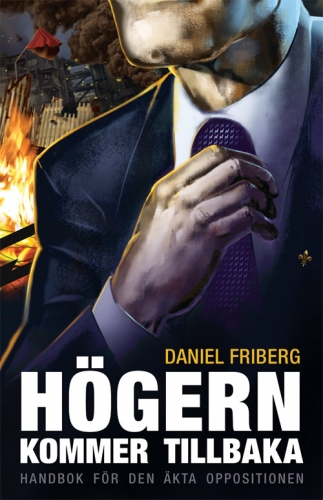 EM :
EM : 

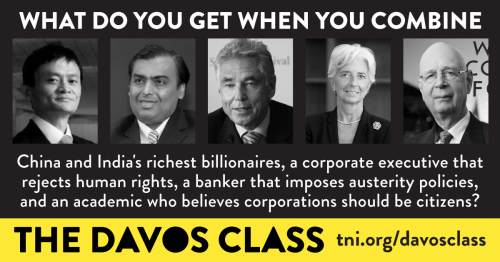




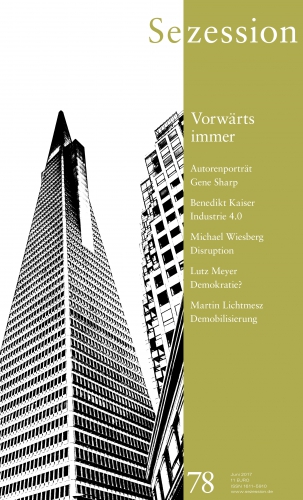

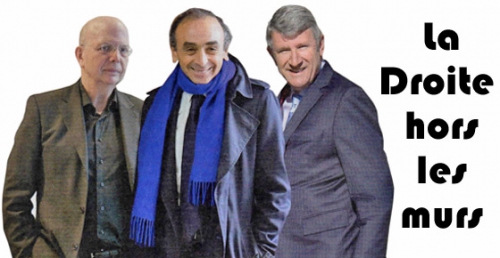
 For full disclosure, let me mention that at least one of Scott’s French contacts, Arnaud Imatz, who represents perfectly the kind of French intellectual he describes, is someone whom the author met through me. Arnaud and I have been friends and correspondents for over 30 years, and his understanding of the French nation and the enjeu social (social question) confronting his people make eminently good sense to Scott and me. Although I have focused on German more than French intellectual history, most of the authors and social critics whom Scott cites are for me familiar names. I agree with Scott that Éric Zemmour, a Moroccan Jew who has tried to revive the sense of French honor that he associates with the late General de Gaulle, illustrates the new identitarian French politics. So too does the iconoclastic novelist Michel Houellebecq, who, despite his shockingly erotic work, clearly loathes multiculturalism and despises French Islamophiles. Another figure in this Pleiades of intellectuals of the French right is Christophe Guilluy, who often sounds like the French Steve Bannon. In his books La France périphérique(2014) and Le crepuscule de la France d’en haut (2016), Guilluy comes to the defense of that 60 percent of the French population living on the “periphery,” that is, outside of metropolitan areas and the sprawling suburbs. These are the “les Francais de souche,” the true indigenous French, whom the globalist elites treat like human waste while they cut production costs by bringing in cheap labor from the Muslim Third World.
For full disclosure, let me mention that at least one of Scott’s French contacts, Arnaud Imatz, who represents perfectly the kind of French intellectual he describes, is someone whom the author met through me. Arnaud and I have been friends and correspondents for over 30 years, and his understanding of the French nation and the enjeu social (social question) confronting his people make eminently good sense to Scott and me. Although I have focused on German more than French intellectual history, most of the authors and social critics whom Scott cites are for me familiar names. I agree with Scott that Éric Zemmour, a Moroccan Jew who has tried to revive the sense of French honor that he associates with the late General de Gaulle, illustrates the new identitarian French politics. So too does the iconoclastic novelist Michel Houellebecq, who, despite his shockingly erotic work, clearly loathes multiculturalism and despises French Islamophiles. Another figure in this Pleiades of intellectuals of the French right is Christophe Guilluy, who often sounds like the French Steve Bannon. In his books La France périphérique(2014) and Le crepuscule de la France d’en haut (2016), Guilluy comes to the defense of that 60 percent of the French population living on the “periphery,” that is, outside of metropolitan areas and the sprawling suburbs. These are the “les Francais de souche,” the true indigenous French, whom the globalist elites treat like human waste while they cut production costs by bringing in cheap labor from the Muslim Third World.


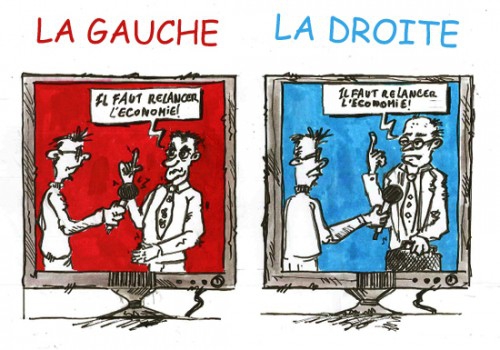


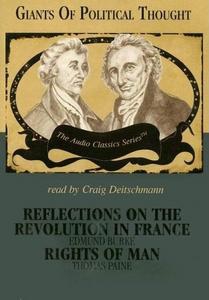 Streets named after saints were given new names, and statues of saints were actually guillotined. (These people guillotining statues were the rational ones, you understand.) The calendar itself, rich with religious feasts, was replaced by a more “rational” calendar with 30 days per month, divided into three ten-day weeks, thereby doing away with Sunday. The remaining five days of the year were devoted to secular observances: celebrations of labor, opinion, genius, virtue, and rewards.
Streets named after saints were given new names, and statues of saints were actually guillotined. (These people guillotining statues were the rational ones, you understand.) The calendar itself, rich with religious feasts, was replaced by a more “rational” calendar with 30 days per month, divided into three ten-day weeks, thereby doing away with Sunday. The remaining five days of the year were devoted to secular observances: celebrations of labor, opinion, genius, virtue, and rewards.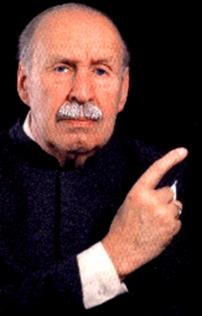 Is Kuehnelt-Leddihn’s description partly out of date? After all, who touts their allegiance to “diversity” more than the left? But the left’s version of diversity amounts to uniformity of an especially insidious kind. No one may hold a dissenting view about the desirability of “diversity” itself, of course, and “diverse” college faculties are chosen not for their diversity of viewpoints but precisely for their dreary sameness: left-liberals of all shapes and sizes. What’s more, by demanding “diversity” and proportional representation in as many institutions as possible, the left aims to make all of America exactly the same.
Is Kuehnelt-Leddihn’s description partly out of date? After all, who touts their allegiance to “diversity” more than the left? But the left’s version of diversity amounts to uniformity of an especially insidious kind. No one may hold a dissenting view about the desirability of “diversity” itself, of course, and “diverse” college faculties are chosen not for their diversity of viewpoints but precisely for their dreary sameness: left-liberals of all shapes and sizes. What’s more, by demanding “diversity” and proportional representation in as many institutions as possible, the left aims to make all of America exactly the same.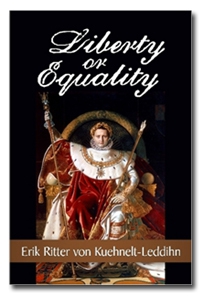 This program, wrote Kuehnelt-Leddihn, “oozes the spirit of leveling leftism: it was democratic; it was anti-Habsburg (it demanded the destruction of the Danube monarchy in favor of the Pan-German program); it was against all unpopular minorities, an attitude that is the magnetism of all leftist ideologies.”
This program, wrote Kuehnelt-Leddihn, “oozes the spirit of leveling leftism: it was democratic; it was anti-Habsburg (it demanded the destruction of the Danube monarchy in favor of the Pan-German program); it was against all unpopular minorities, an attitude that is the magnetism of all leftist ideologies.”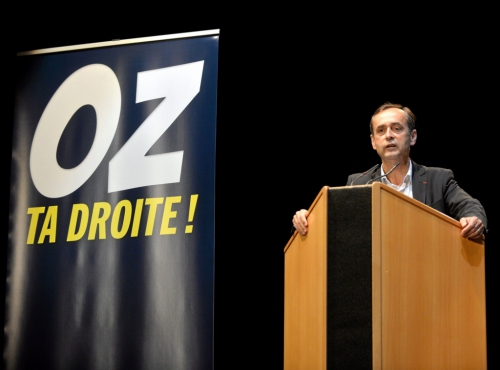


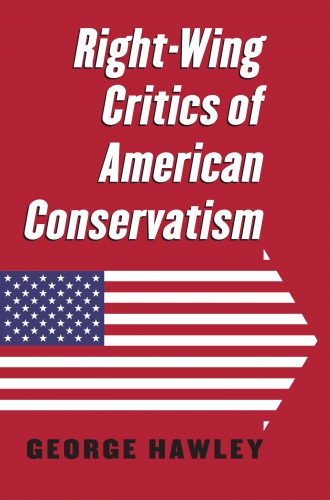
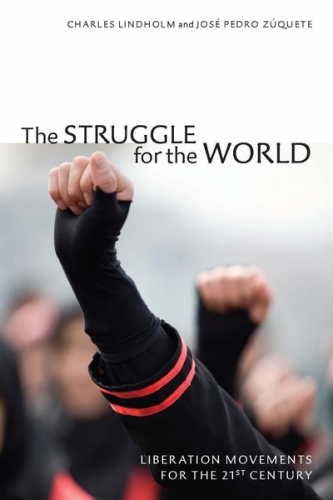 For instance,
For instance, 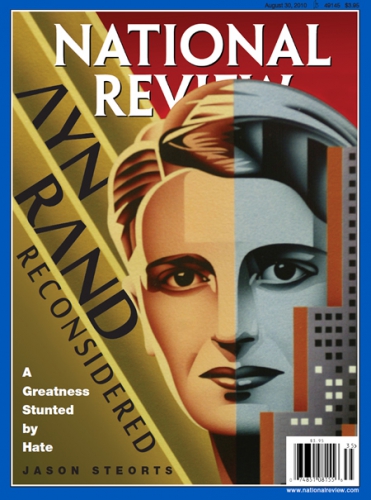 In chapter 1, Hawley argues that modern American conservatism was defined by William F. Buckley and National Review in the 1950s. The conservative movement was a coalition of free market capitalists, Christians, and foreign policy hawks. Hawley points out that based on ideology alone, there is no necessary reason why any of these groups would be Right wing or allied with each other. Indeed, the pre-World War II “Old Right” of people like Albert Jay Nock and H. L. Mencken tended to be anti-interventionist, irreligious, and economically populist and protectionist rather than free market. National Review was also philo-Semitic from the start and increasingly anti-racist, whereas the pre-War American Right had strong racialist and anti-Semitic elements. What unified the National Review coalition was not a common ideology but a common enemy: Communism.
In chapter 1, Hawley argues that modern American conservatism was defined by William F. Buckley and National Review in the 1950s. The conservative movement was a coalition of free market capitalists, Christians, and foreign policy hawks. Hawley points out that based on ideology alone, there is no necessary reason why any of these groups would be Right wing or allied with each other. Indeed, the pre-World War II “Old Right” of people like Albert Jay Nock and H. L. Mencken tended to be anti-interventionist, irreligious, and economically populist and protectionist rather than free market. National Review was also philo-Semitic from the start and increasingly anti-racist, whereas the pre-War American Right had strong racialist and anti-Semitic elements. What unified the National Review coalition was not a common ideology but a common enemy: Communism.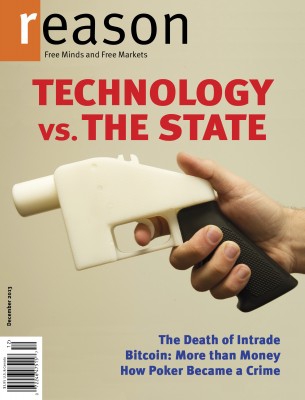 Chapter 5, “Ready for Prime Time?” is devoted to mainstream libertarianism, including Milton Friedman, the Koch Brothers, the Cato Institute, Reason magazine, the Ron Paul movement, and libertarian youth organizations. Chapter 6, “Enemies of the State,” deals with more radical strands of libertarianism, including 19th-century American anarchists like Josiah Warren and Lysander Spooner, the Austrian School of economics, Murray Rothbard, Hans-Hermann Hoppe, Lew Rockwell, the Mises Institute, and the Libertarian Party. Again, Hawley has read widely with an unfailing eye for essentials.
Chapter 5, “Ready for Prime Time?” is devoted to mainstream libertarianism, including Milton Friedman, the Koch Brothers, the Cato Institute, Reason magazine, the Ron Paul movement, and libertarian youth organizations. Chapter 6, “Enemies of the State,” deals with more radical strands of libertarianism, including 19th-century American anarchists like Josiah Warren and Lysander Spooner, the Austrian School of economics, Murray Rothbard, Hans-Hermann Hoppe, Lew Rockwell, the Mises Institute, and the Libertarian Party. Again, Hawley has read widely with an unfailing eye for essentials.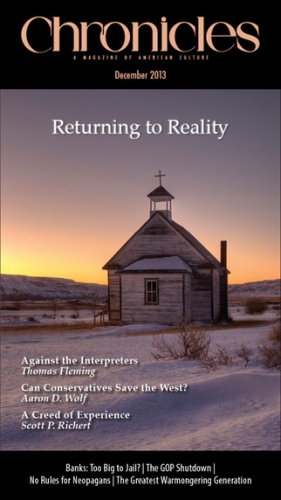 Paleoconservatism is defined in opposition to neoconservatism, the largely Jewish intellectual movement that largely took over mainstream conservatism by the 1980s, aided by William F. Buckley who dutifully purged their opponents. Since the neoconservatives are largely Jewish, and many of the founders were ex-Marxists or Cold War liberals, their ascendancy has meant the subordination of Christian conservatives and free marketeers to the hawkish interventionist wing of the movement. Now that the Cold War is over, the primary concern of neoconservative hawks is tricking Americans into fighting wars for Israel.
Paleoconservatism is defined in opposition to neoconservatism, the largely Jewish intellectual movement that largely took over mainstream conservatism by the 1980s, aided by William F. Buckley who dutifully purged their opponents. Since the neoconservatives are largely Jewish, and many of the founders were ex-Marxists or Cold War liberals, their ascendancy has meant the subordination of Christian conservatives and free marketeers to the hawkish interventionist wing of the movement. Now that the Cold War is over, the primary concern of neoconservative hawks is tricking Americans into fighting wars for Israel. Chapter 9, “Voices of the Radical Right,” covers White Nationalism in America, with discussions of progressive era racialists like Madison Grant and Lothrop Stoddard; contemporary race realism; the rise and decline of such organizations as the KKK, American Nazi Party, Aryans Nations, and the National Alliance; the world of online White Nationalism; and Kevin MacDonald’s work on the Jewish question — which brings us up to where we started, namely the task of forging a North American New Right.
Chapter 9, “Voices of the Radical Right,” covers White Nationalism in America, with discussions of progressive era racialists like Madison Grant and Lothrop Stoddard; contemporary race realism; the rise and decline of such organizations as the KKK, American Nazi Party, Aryans Nations, and the National Alliance; the world of online White Nationalism; and Kevin MacDonald’s work on the Jewish question — which brings us up to where we started, namely the task of forging a North American New Right.
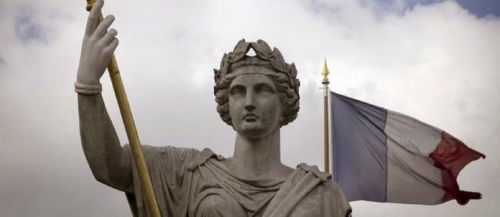

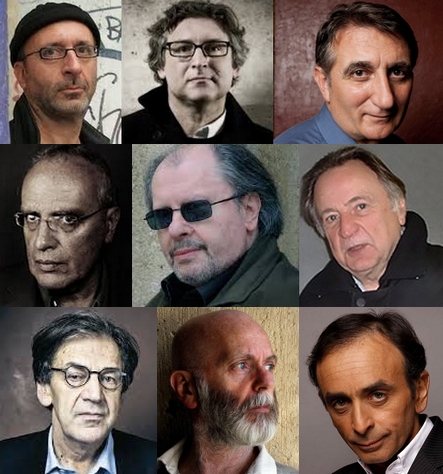





 The volume at hand, Standardbearers, seems to have been assembled in the late 1990s to help forge a new middle-way Rightism. It was the early Tony Blair years. The Conservatives were in the wilderness, in thrall to Political Correctness, and the respectable Right had lost its way. Tony Blair had a way of dismissing his opponents’ arguments by describing them as “the past.” As Antony Flew describes in the Foreword:
The volume at hand, Standardbearers, seems to have been assembled in the late 1990s to help forge a new middle-way Rightism. It was the early Tony Blair years. The Conservatives were in the wilderness, in thrall to Political Correctness, and the respectable Right had lost its way. Tony Blair had a way of dismissing his opponents’ arguments by describing them as “the past.” As Antony Flew describes in the Foreword: